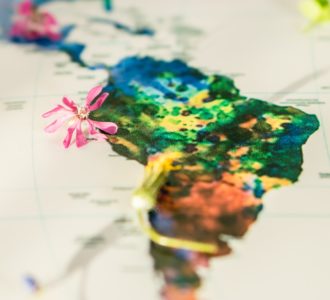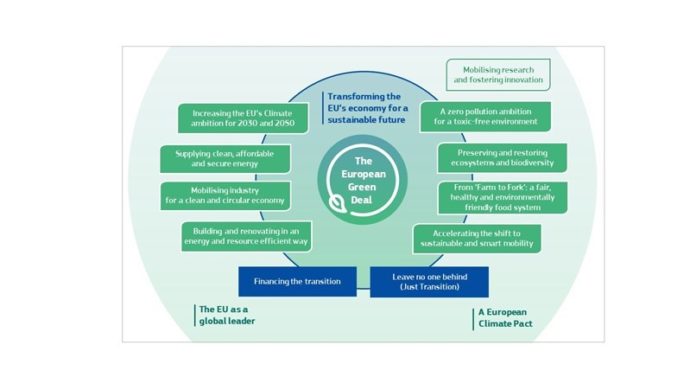In today’s world, the global need for both green and digital skills is increasing daily, and we also require a fast, sustainable, and fair transition to a more resilient working life. In the EU-funded VIHTA project (2022-2023), Laurea, Haaga-Helia and Metropolia Universities of Applied Sciences are together promoting digital solutions for green work in the metropolitan area. This small article elaborates the background to the green transition.
Global green skills and the Great Reshuffle
 Olha Ruskykh / Pexels
Olha Ruskykh / Pexels
LinkedIn published recently their Global Green Skills Report 2022, where they established that our world is presently witnessing a historic transformation in how people work, where they work and why they work. At this very moment, business models are being reinvented, new types of markets are emerging, and novel skills, especially green skills, are needed. Global Green Skills Report 2022 calls this the Great Reshuffle, an unparalleled moment in history where we need to recreate and reimagine our future work in a very compressed timeframe of only a few years.
In addition to economic and social skills, environmental skills and green upskilling are of crucial importance if we are to rapidly succeed in the green transition. When new workers and younger generations are equipped with green skills, this can have a fast and positive ripple effect on both new and traditional industries. Every country and all different sectors need to increase green skills intensity and green jobs as well as provide more opportunities for those with green competence. Urgent climate action that is beneficial both for the planet and workers can lead to more jobs and more career opportunities even in the midst of global crises.
The European Green Deal
The European Union intends to turn this urgent challenge into a unique opportunity by its growth strategy of the European Green Deal that aims to transform the EU into a fair and prosperous Europe, with an economy that is both modern and competitive yet also resource-efficient and sustainable. This ambitious strategy with its deeply transformative policies, as visualised below, focuses on making the EU a global leader in green activities.
 Figure 1: The European Green Deal. Source: European Commission
Figure 1: The European Green Deal. Source: European Commission
The European Green Deal emphasizes the need to rethink our societies from clean energy supply across the economy to industry, production, and consumption. Also, for example large-scale infrastructure, transport, food and agriculture, construction, taxation, and social benefits need new creative thinking and new innovations. In addition, the EU plans to promote and invest in the necessary digital transformation and change-enabling tools. As it is essential that no one is left behind, the European Pillar of Social Rights will also guide all the Green Deal actions.
The Twin Transition and Industry 5.0
In addition to the greening of working life, new technology, digitalisation, and innovation promotion are some of the key words that describe our future, together with the Twin Transition, meaning the combination of digital transformation with sustainability development.
In the EU’s Industry 5.0 policy brief by Breque, De Nul, and Petridis, such industrial policies are called for that can provide the best conditions for innovations to flourish and our societies to be benefitted by leaving no one behind, while respecting the boundaries of the planet. To stay competitive, European industry needs to constantly innovate and focus on European priorities, such as the above-mentioned European Green Deal, Europe Fit for the Digital Age, and an Economy that Works for People.
As the EU has called this decade Europe’s Digital Decade, a new generation of innovative technologies are needed to empower people, businesses, and societies and to successfully transform the digital landscape in the EU to include and equally benefit all its members.
The VIHTA project: finding digital solutions for green work
To succeed in just, sustainable, resilient, and inclusive green transition, coordinated regional and global actions, investments, and gender- and education-aware policies are needed both in the EU and globally. Policymakers need to support green skills and prepare us all for the green transition.
This is possible by identifying those jobs that have the highest ability to turn sectors and countries green. Business leaders need to invest in future green talent and hire diverse talent with green skills, and the global workforce need to gain green intensity by for example extending their networks and choosing careers that support upskilling and also elearning opportunities. The green transition cannot happen without green skills, green talent, and green jobs.
To answer some of these green and digital challenges and possibilities within the Finnish context, the VIHTA – Digital solutions for green work project will cultivate green and digital work for the future. In autumn 2022, VIHTA will support and educate advisors working in counselling for unemployed/entrepreneurs and for entrepreneurship counsellors in higher education. The VIHTA project focuses on training, facilitation, service design, and guidance that will increase and improve digital and green work in the metropolitan area. The project is run by Haaga-Helia, Laurea, and Metropolia, and its associate partners in the metropolitan area are Helsinki City Council Economic Development, Employment services, NewCo Helsinki, and Helsinki City Council Economic Development, Innovations and New Experiments.
The Global Green Skills Report 2022 concludes that to promote the global development of green talent and green economies as well as green growth, it is essential to support the networking, innovation, new technology and talent development possibilities for green entrepreneurs. This is also something that the VIHTA project intends to focus on.
Sources:
- Breque, M., De Nul, L., Petridis, A. 2021. Industry 5.0: towards a sustainable, human-centric and resilient European industry, Publications Office, European Commission, Directorate-General for Research and Innovation. Accessed 20.6.2022. https://data.europa.eu/doi/10.2777/308407
- Darvariou, S. & Negru, M. 24.5.2022. Upskilling for the Green Transition. The Upcoming Green Revolution. 2030 Builders. Accessed 14.6.2022. https://2030.builders/articles/upskilling-green-transition/
- EC Priorities 2019-2024. A Europe fit for the digital age. Accessed 20.6.2022. https://www.upf.edu/web/eu-governance/a-europe-fit-for-the-digital-age
- European Commission. An economy that works for people. Accessed 20.6.2022. https://ec.europa.eu/info/strategy/priorities-2019-2024/economy-works-people_en
- European Commission. The European Green Deal. Accessed 14.6.2022. https://eur-lex.europa.eu/legal-content/EN/TXT/HTML/?uri=CELEX:52019DC0640&from=EN
- European Commission. Europe’s Digital Decade: digital targets for 2030. Accessed 20.6.2022. https://ec.europa.eu/info/strategy/priorities-2019-2024/europe-fit-digital-age/europes-digital-decade-digital-targets-2030_en
- International Labour Office: Anticipating skill needs for green jobs. A practical guide. Geneva. 2015. Accessed 14.6.2022. https://www.ilo.org/wcmsp5/groups/public/—ed_emp/—ifp_skills/documents/publication/wcms_564692.pdf
- LinkedIn Economic Graph: Global Green Skills Report 2022. Accessed 17.6.2022. https://economicgraph.linkedin.com/research/global-green-skills-report